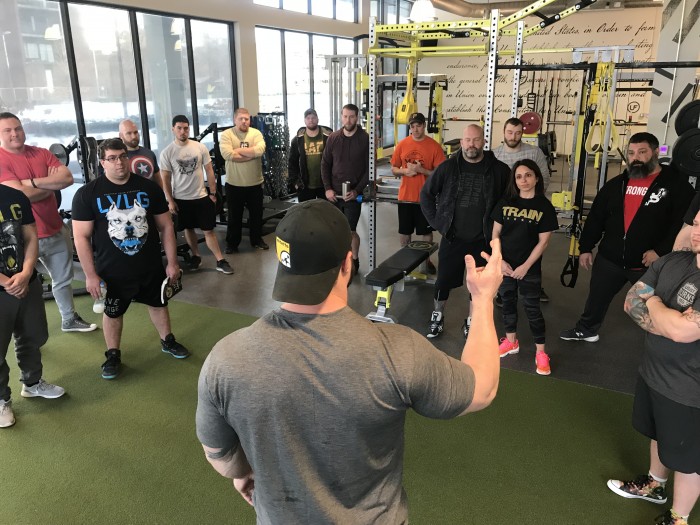
I'm going to attempt an ongoing series of articles related to my brief but successful experience in managing a commercial gym. Team members like JL, Murph, Alwyn, and David Allen have been doing this for MUCH longer than myself. However, my experience in corporate America is invaluable in adding to my leadership style and makes my approach somewhat unique. *For those that haven't followed my story, I was the youngest account manager in US Land and throughout the world for a Fortune 500 company- from the age of 24-28.
My aim is to provide an honest and transparent insight into what I have learned through my successes and failures in my time at Union Fitness. So read on nerds...
__________________________________________________________________________
Recently I have noticed that my staff has become sloppy- and fear not, it starts from the top. It started with me noticing typos in our blog posts. I brought the situation up to my assistant manager and she poured a bunch of other examples on me. Then I brought it up in our staff meeting and they dumped even more issues on me.
The short list:
Typos in our blog posts. Running out of towels. Body soaps not being filled up. Playing inappropriate music in our Fitness Center. Not doing tour sheets and paperwork consistently. Floors being covered in salt. Etc.
1. My staff is fantastic. I appreciate their honesty and engagement.
2. I try to give them as much autonomy as I can- the more ownership they take of the gym and of their job, the better off we all are.
So if my staff noticed these things, why weren't they taking the initiative to fix it themselves?
This was never a problem when we were small. As we've grown, we've forgotten our attention to detail. The reason we were letting things fall through the cracks- Diffusion of Responsibility.
It is a result of the Bystander Effect-
The bystander effect occurs when the presence of others discourages an individual from intervening in an emergency situation. Social psychologists Bibb Latané and John Darley popularized the concept following the infamous 1964 Kitty Genovese murder in New York City.
If you're interested, look it up. So back to the Diffusion of Responsibility...
Diffusion of responsibility occurs when people who need to make a decision wait for someone else to act instead. ... (It) makes people feel less pressure to act because they believe, correctly or incorrectly, that someone else will do so.
An example would be if someone were to drop to the ground on the street because of an apparent heart attack, if there were one person there, that person would either a) call 911, b) perform CPR, or c) both. If there were 20 people there, research has proven that people rarely call 911 because they think someone else has already called. And if they are CPR certified, they hesitate because they think someone else may be more experienced than them. There's another interesting piece of social conformity as well but for time's sake I'll leave it at that. You can and should research this if you manage people.
So what does all of this have to do with a gym? As my staff grew, so did our complacency. We started getting sloppy because we were busier and we assumed if "I don't do it surely someone else will."
The fix-
During our staff meeting we openly discussed things we weren't pleased with- and everyone had gripes. So I broke it down into PATD.
Pride. Attention to Detail. Teamwork. Discipline.
All of our issues could be solved with these values. The easiest way to attack a problem is to break it down, so we decided to break our business hours down into 5 parts.
1. Opening procedures at 5am.
2. Post morning rush from 6-9am.
3. Afternoon rush from 10-2pm.
4. Evening rush from 3-8pm.
5. Closing procedures from 8-9pm.
As a staff we communicated who should be responsible for what tasks using logic and efficiency. No one passed the buck. Everyone took pride in saying "I can do that," or they were honest in saying "I think it's best if so and so handles that task."
So it wasn't that my staff was lazy. We all became complacent with our success, which would be short lived if we didn't start taking care of the small details that contribute to or detract from our members' experience. It's easy to get someone to walk through the door. It's difficult to keep them coming back, unless you take care of the small things, day in and day out.
Takeways:
1. Don't jump to conclusions.
-A year ago, I would have assumed that my staff was being lazy. More experience and increased patience gave me a better point of view for this situation. My staff didn't get lazy overnight. So what changed? It helped me put two and two together. So have faith in the people you had faith in yesterday when shit hits the fan.
2. Communicate, then communicate some more.
We had to prioritize tasks so we could use our time efficiently. Then we had to take responsibility so things would get done. Now I have to hammer that home everyday through communication. It takes 21 days to create a new habit. So guess what I'm doing the next three weeks?
3. Be consistent.
Especially when providing a service, the small things matter. If you provide Qtips in the bathroom and they're out one day, you're not going to hear about it. But if it happens often enough, those small things add up and someone won't renew their membership. So you added something free to help improve their experience, and it can eventually turn the customer against you.
*Read The E Myth by Michael Gerber if you own or plan on owning your own business one day.









1 Comment